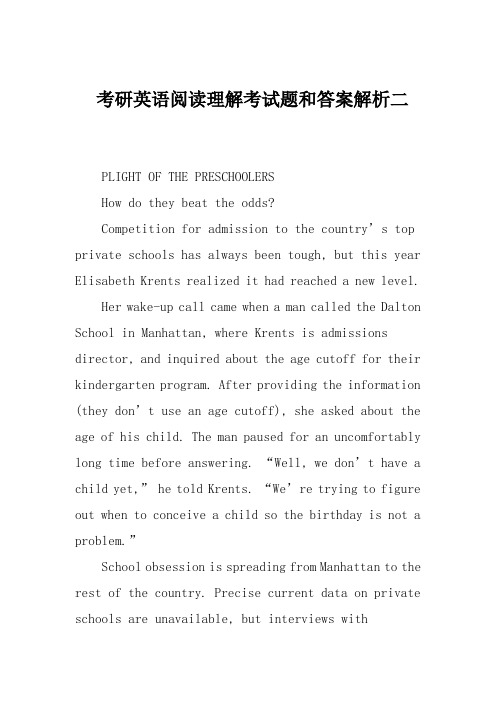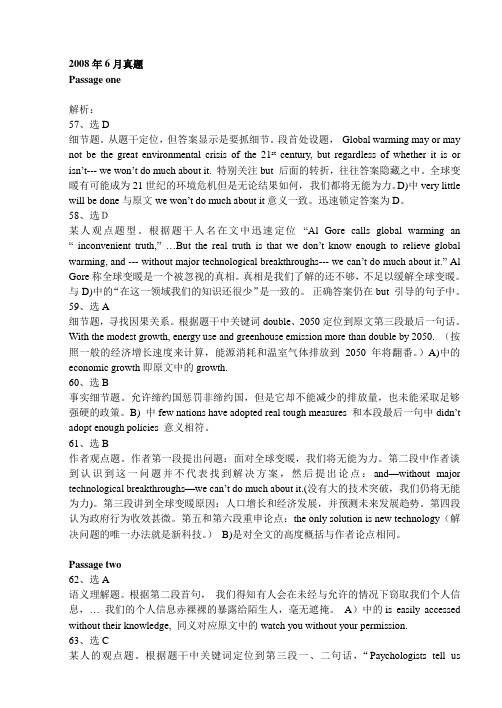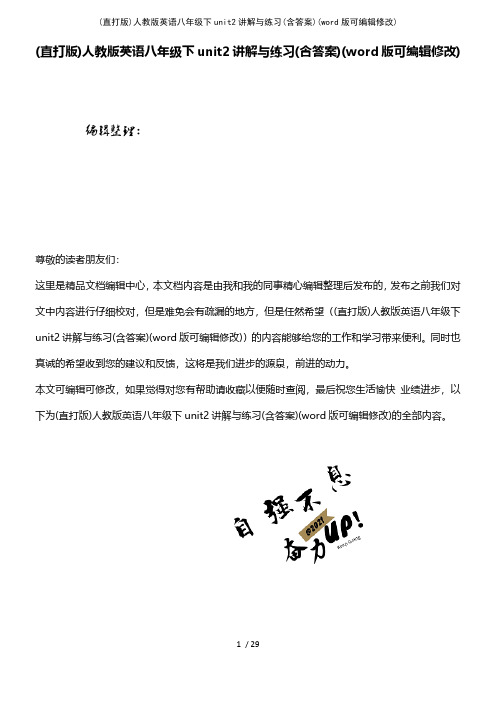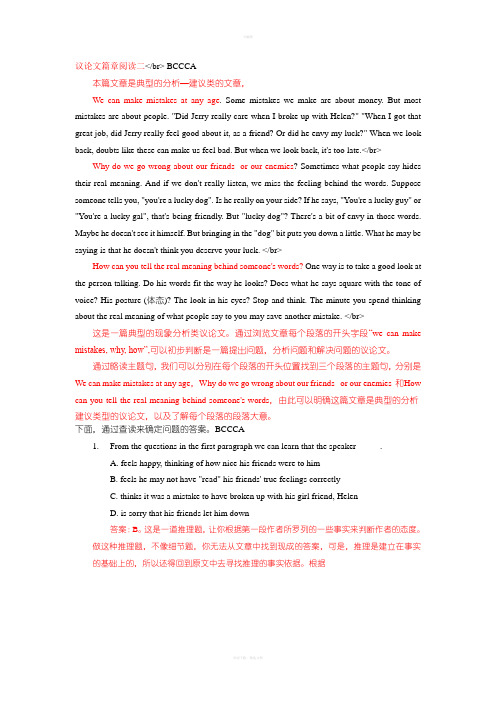篇章训练2答案及解析
考研英语阅读理解考试题和答案解析二

考研英语阅读理解考试题和答案解析二PLIGHT OF THE PRESCHOOLERSHow do they beat the odds?Competition for admission to the country’s top private schools has always been tough, but this year Elisabeth Krents realized it had reached a new level.Her wake-up call came when a man called the Dalton School in Manhattan, where Krents is admissions director, and inquired about the age cutoff for their kindergarten program. After providing the information (they don’t use an age cutoff), she asked about the age of his child. The man paused for an uncomfortably long time before answering. “Well, we don’t have a child yet,” he told Krents. “We’re trying to figure out when to conceive a child so the birthday is not a problem.”School obsession is spreading from Manhattan to the rest of the country. Precise current data on private schools are unavailable, but interviews withrepresentatives of independent and religious schools all told the same story: a glut of applicants, higher rejection rates. “We have people calling u s for spots two years down the road,” said Marilyn Collins of the Seven Hills School in Cincinnati. “We have grandparents calling for pregnant daughters.”Public-opinion poll after poll indicates that Americans’ No. 1 concern is education. Now that the long economic boom has given parents more disposable income, many are turning to private schools, even at price tags of well over $10,000 a year. “We’re getting applicants from a broader area, geographically, than we ever have in the past,” said Betsy Haug h of the Latin School of Chicago, which experienced a 20 percent increase in applications this year.The problem for the applicants is that while demand has increased, supply has not. “Every year, there are a few children who do not find places, but this year, for the first time that I know of, there are a significant number of children who don’t have places,” said Krents, who also heads a private-school admissions group in New York.So what can parents do to give their 4-year-old an edge? Schools know there is no foolproof way to pick a class when children are so young. Many schools give preference to siblings or alumni children.Some use lotteries. But most rely on a mix of subjective and objective measures: tests that at best identify developmental maturity and cognitive potential, interviews with parents and observation of applicants in classroom settings. They also want a diverse mix. Children may end up on a waiting list simply because their birthdays fall at the wrong time of year, or because too many applicants were boys.The worst thing a parent can do is to pressure preschoolers to perform--for example, by pushing them to read or do math exercises before they’re ready. Instead, the experts say, parents should take a breath and look for alternatives. Another year in preschool may be all that’s needed. Parents, meanwhile, may need a more open mind about relatively unknown private schools--or about magnet schools in the public system. There’s no sign of the private-school boom letting up. Dal ton’s spring tours, for early birds interested inthe 2001-2002 school year, are filled. The wait list? Forget it. That’s closed, too.By Pat Wingert Newsweek; 05/15/2000, Vol. 135 Issue 20, p76, 2/3p, 1c注 (1) :本文选自 Newsweek , 05/15/2000, p761.The author uses the examples to show __________.[A]the concern of Americans[B]the charm of the private schools[C]the fierce situation for preschoolers[D]the economic situation of American families2.What is implied in Paragraph 4?[A]The harsh way of forming a class.[B]The high expectation of the parents.[C]The wise selection of the school.[D]The difficulty of getting enrolled.3.The author ’ s attitude toward this event is __________.[A]indifferent[B]apprehensive[C]supportive[D]indignant4.Instead of giving their children great pressureto outperform, the parents should ______.[A]avoid the competition and wait for another year[B]give up their first choice and go to the unknown school[C]let their children be and do what they want to do[D]deal with the matter more casually and rethink the situation5.The text intends to express _________.[A]the popularity of the private schools[B]parents ’ worry about their children ’ s schooling[C]the plight of the preschoolers[D]the severe competition in going to school篇章剖析本文采用提出问题 --- 分析问题的模式。
篇章训练2答案及解析复习过程

篇章训练2答案及解析议论文篇章阅读二</br> BCCCA本篇文章是典型的分析—建议类的文章,We can make mistakes at any age. Some mistakes we make are about money. But most mistakes are about people. "Did Jerry really care when I broke up with Helen?" "When I got that great job, did Jerry really feel good about it, as a friend? Or did he envy my luck?" When we look back, doubts like these can make us feel bad. But when we look back, it's too late.</br>Why do we go wrong about our friends--or our enemies? Sometimes what people say hides their real meaning. And if we don't really listen, we miss the feeling behind the words. Suppose someone tells you, "you're a lucky dog". Is he really on your side? If he says, "You're a lucky guy" or "You're a lucky gal", that's being friendly. But "lucky dog"? There's a bit of envy in those words. Maybe he doesn't see it himself. But bringing in the "dog" bit puts you down a little. What he may be saying is that he doesn't think you deserve your luck. </br>How can you tell the real meaning behind someone's words? One way is to take a good look at the person talking. Do his words fit the way he looks? Does what he says square with the tone of voice? His posture (体态)? The look in his eyes? Stop and think. The minute you spend thinking about the real meaning of what people say to you may save another mistake. </br>这是一篇典型的现象分析类议论文。
篇章及快速阅读题答案

篇章阅读理解练习与真题答案Exercise 1 B C A D D / B C A D DExercise 2 B A D C B / D D A A CExercise 3 D B A D C / B B D C AExercise 4 D D D B A / C D B D DExercise 5 D B A B A / A A C C BExercise 6 C B D A D / C C B B DExercise 7 B D A B B / D C C C CExercise 8 B B C A A / B A C D BExercise 9 B C D C B / D B A C DExercise 10 D D C A A / B D C B C真题05样题 C A B C A / B D D A C06-06 D C A B C / D B C B D06-12 C B D A B / C A D B C07-06 D B C B A / D A C D C07-12 A C D C B / A B C A B08-06 D D A B B / A C B D DPassage one(2006年6月英语四级真题) Highways【结构分析】Para. 1—Para. 3给出背景和提出问题:20世纪早期美国公路呈现落后状况;直到1921年各地公路很不规范,没有国家标准的公路,比德国的汽车高速公路落后很多;不能满足二战防御措施对公路的要求。
Para. 4—Para. 5提出解决问题的方案:1956年开始着手建洲际高速公路,在建的过程中提出了很多开创性的设计方案解决了全国地理特征不同问题。
Para. 6—Para. 9正面评价洲际高速公路给美国带来的利益:使美国交通四通八达并且死亡事故减少;使城乡消费者便利和带来美国人最珍贵的流动自由的价值理念;促进美国经济的发展,促进沿路的副业发展。
篇章阅读理解学生自做部分的答案

2008年6月真题Passage one解析:57、选D细节题。
从题干定位,但答案显示是要抓细节。
段首处设题,Global warming may or may not be the great environmental crisis of the 21st century, but regardless of whether it is or isn’t--- we won’t do much about it. 特别关注but 后面的转折,往往答案隐藏之中。
全球变暖有可能成为21世纪的环境危机但是无论结果如何,我们都将无能为力。
D)中very little will be done与原文we won’t do much about it意义一致。
迅速锁定答案为D。
58、选D某人观点题型。
根据题干人名在文中迅速定位“A l Gore calls global warming an “inconvenient truth,”…B ut the real truth is that we don’t know enough to relieve global warming, and --- without major technological breakthroughs--- we can’t do much about it.” Al Gore称全球变暖是一个被忽视的真相。
真相是我们了解的还不够,不足以缓解全球变暖。
与D)中的“在这一领域我们的知识还很少”是一致的。
正确答案仍在but 引导的句子中。
59、选A细节题,寻找因果关系。
根据题干中关键词double、2050定位到原文第三段最后一句话。
With the modest growth, energy use and greenhouse emission more than double by 2050. (按照一般的经济增长速度来计算,能源消耗和温室气体排放到2050年将翻番。
(精校版)人教版英语八年级下unit2讲解与练习(含答案)

(直打版)人教版英语八年级下unit2讲解与练习(含答案)(word版可编辑修改)编辑整理:尊敬的读者朋友们:这里是精品文档编辑中心,本文档内容是由我和我的同事精心编辑整理后发布的,发布之前我们对文中内容进行仔细校对,但是难免会有疏漏的地方,但是任然希望((直打版)人教版英语八年级下unit2讲解与练习(含答案)(word版可编辑修改))的内容能够给您的工作和学习带来便利。
同时也真诚的希望收到您的建议和反馈,这将是我们进步的源泉,前进的动力。
本文可编辑可修改,如果觉得对您有帮助请收藏以便随时查阅,最后祝您生活愉快业绩进步,以下为(直打版)人教版英语八年级下unit2讲解与练习(含答案)(word版可编辑修改)的全部内容。
Unit 2 I’ll help to clean up the city parks.Section A1。
You should help to clean up the city parks.Clean up意为“彻底打扫;清除”,是“动词+副词”结构的短语动词,后面跟名词作宾格时,名词放在up前后均可,后面跟代词作宾格时,代词应当放在up前面。
e.g。
He often helps parents clean up the rooms on weekends。
2。
The girl could visit the sick kids in the hospital to cheer them up。
Cheer up意为“变得更高兴,振奋起来",是“动词+副词”结构的短语,cheer up既可以作及物动词短语,也可以作不及物动词短语e。
g。
He cheered up at once when I agreed to help him.Cheer up! The news isn’t too bad.He took her to the cinema to cheer her up。
篇章训练2答案及解析

议论文篇章阅读二</br> BCCCA本篇文章是典型的分析—建议类的文章,We can make mistakes at any age. Some mistakes we make are about money. But most mistakes are about people. "Did Jerry really care when I broke up with Helen?" "When I got that great job, did Jerry really feel good about it, as a friend? Or did he envy my luck?" When we look back, doubts like these can make us feel bad. But when we look back, it's too late.</br> Why do we go wrong about our friends--or our enemies? Sometimes what people say hides their real meaning. And if we don't really listen, we miss the feeling behind the words. Suppose someone tells you, "you're a lucky dog". Is he really on your side? If he says, "You're a lucky guy" or "You're a lucky gal", that's being friendly. But "lucky dog"? There's a bit of envy in those words. Maybe he doesn't see it himself. But bringing in the "dog" bit puts you down a little. What he may be saying is that he doesn't think you deserve your luck. </br>How can you tell the real meaning behind someone's words? One way is to take a good look at the person talking. Do his words fit the way he looks? Does what he says square with the tone of voice? His posture (体态)? The look in his eyes? Stop and think. The minute you spend thinking about the real meaning of what people say to you may save another mistake. </br> 这是一篇典型的现象分析类议论文。
2006年考研英语答案解析和参考译文(二)

SectionⅠUse of English 篇章导读 本⽂是⼀篇论说⽂。
⽂章的主题是“英才通才教育”。
作者在⽂章开头就提出了⼀个具有选择性的问题:“如果我们只是需要决定是把基本的科学传授给每个⼈,还是找⼀些有才华的⼈,引领他们变得更出⾊,那么我们的⼯作将会相当容易。
”随后作者从“the education in public school, the balance among the branches of knowledge and the balance between current and classical knowledge”三个⽅⾯来论述在教育中保持知识平衡的重要性。
解读⽂章时注意作者的客观态度。
思路解析 1「答案」[C] 「解析」“选择”。
根据⽂章⼀致性原则,“choice”与⽂章第⼀句中的“decide决定”形成呼应,根据原⽂“decide whether……or……”所以下⽂就应该是对其有所“选择choice”或没有“选择choice”。
⽽选项[A]“(与属性区别的)本质:the entity of justice正义的本质”,[B]“拍卖;(某些纸牌戏中的)叫牌;叫牌阶段”,[D]“结合体,联合;(政党、个⼈、国家等)临时结成的联盟”是本题的⼲扰,均不形成呼应,不符合题意。
2「答案」[D] 「解析」“因为”。
“for”与⽂章第⼀段第三句中的“Because we depend……”构成搭配,均表⽰解释原因。
⽽选项[A][B][C]均不⽤于解释原因,不符合原⽂意思。
3「答案」[D] 「解析」“坚持下去;继续下去”。
“carry on”与原⽂中的“at the same time同时”是⼀种搭配,⽽且根据原⽂意思:“由于这种⼯作必须同时继续下去”,所以选择“carry on”。
⽽选项[A]“carry off拿⾛,搬⾛;抓⾛;夺⾛;致……死亡”,[B]“carry forward 推进,使前进”,[C]“carry away拿⾛,搬⾛;抢⾛;冲⾛,卷⾛;使激动⽽失去⾃制⼒;吸引住”均不符合题意。
2020新教材人教版英语必修第二册同步培优练习:UNIT2 Wildlife protection Section Ⅱ含答案

Section ⅡReading and Thinking基础知识预习自检在云端的一天空气稀薄,我们不得不在离营地不远的徒步旅行中休息几次。
在我们的左边,被雪覆盖的山峰消失在云层中,那些云看起来似乎触手可及。
放眼平原,我们隐约看到一群体形优美的动物。
这是我们来到这里的原因——去观察藏羚羊。
藏羚羊住在西藏、新疆和青海的平原上。
看着它们缓慢地穿过绿草地,我被它们的美丽所震撼。
我也想起它们身处险境。
因为它们珍贵的皮毛,它们正遭受非法猎杀。
我的向导叫扎西,是长塘的村民。
他在长塘自然保护区工作。
这个保护区是西藏西北部动物和植物的避难所。
对扎西来说,土地是神圣的,保护野生动物是一种生活方式。
“我们不是在保护动物,”他说:“实际上,我们是在保护我们自己”。
20世纪80年代和90年代,藏羚羊经历了一段艰难时期。
藏羚羊的总数量急剧下降超过百分之五十。
偷猎者射杀藏羚羊来获取利益。
它们的栖息地也因为新公路和铁轨的建成而变得越来越狭小。
为了保护这个物种不灭绝,中国政府将其置于国家保护之下。
为了它们免于受到攻击,扎西和其他的志愿者昼夜看守这些藏羚羊。
桥和门被添加,让藏羚羊容易移动,使它们安全远离汽车和火车。
采取的措施很有效。
藏羚羊的数量在2015年6月已经恢复,并且藏羚羊从濒临物种名单上被移除。
然而,政府并不打算终止藏羚羊保护项目,因为对藏羚羊的威胁还没有完全消失。
晚上,我喝着茶看着星空。
我想着藏羚羊和扎西对我说的话。
采取了很多措施去保护野生动物,但是如果我们真的想拯救这个星球,我们必须改变我们的生活方式。
只有学会和自然界和谐相处,我们才不会成为野生生物和地球的威胁。
重点知识合作探究I'd like to reserve_a_table_for three for seven o'clock.我想预订七点钟供三人用餐的桌位。
②These seats are reserved_for special guests.这些座位是留给贵宾的。
- 1、下载文档前请自行甄别文档内容的完整性,平台不提供额外的编辑、内容补充、找答案等附加服务。
- 2、"仅部分预览"的文档,不可在线预览部分如存在完整性等问题,可反馈申请退款(可完整预览的文档不适用该条件!)。
- 3、如文档侵犯您的权益,请联系客服反馈,我们会尽快为您处理(人工客服工作时间:9:00-18:30)。
议论文篇章阅读二</br> BCCCA本篇文章是典型的分析—建议类的文章,We can make mistakes at any age. Some mistakes we make are about money. But most mistakes are about people. "Did Jerry really care when I broke up with Helen?" "When I got that great job, did Jerry really feel good about it, as a friend? Or did he envy my luck?" When we look back, doubts like these can make us feel bad. But when we look back, it's too late.</br> Why do we go wrong about our friends--or our enemies? Sometimes what people say hides their real meaning. And if we don't really listen, we miss the feeling behind the words. Suppose someone tells you, "you're a lucky dog". Is he really on your side? If he says, "Y ou're a lucky guy" or "Y ou're a lucky gal", that's being friendly. But "lucky dog"? There's a bit of envy in those words. Maybe he doesn't see it himself. But bringing in the "dog" bit puts you down a little. What he may be saying is that he doesn't think you deserve your luck. </br>How can you tell the real meaning behind someone's words? One way is to take a good look at the person talking. Do his words fit the way he looks? Does what he says square with the tone of voice? His posture (体态)? The look in his eyes? Stop and think. The minute you spend thinking about the real meaning of what people say to you may save another mistake. </br> 这是一篇典型的现象分析类议论文。
通过浏览文章每个段落的开头字段“we can make mistakes, why, how”,可以初步判断是一篇提出问题,分析问题和解决问题的议论文。
通过略读主题句,我们可以分别在每个段落的开头位置找到三个段落的主题句,分别是We can make mistakes at any age,Why do we go wrong about our friends--or our enemies 和How can you tell the real meaning behind someone's words,由此可以明确这篇文章是典型的分析-建议类型的议论文,以及了解每个段落的段落大意。
下面,通过查读来确定问题的答案。
BCCCA1. From the questions in the first paragraph we can learn that the speaker _____.A. feels happy, thinking of how nice his friends were to himB. feels he may not have "read" his friends' true feelings correctlyC. thinks it was a mistake to have broken up with his girl friend, HelenD. is sorry that his friends let him down答案:B。
这是一道推理题,让你根据第一段作者所罗列的一些事实来判断作者的态度。
做这种推理题,不像细节题,你无法从文章中找到现成的答案,可是,推理是建立在事实的基础上的,所以还得回到原文中去寻找推理的事实依据。
根据A,C,D的选项,A说作者感到高兴,他朋友们对他很好。
C说作者认为跟他的女友分手是个错误,D说作者感到伤心,朋友们让他失望了。
这几个选项都太片面,只是针对其中的一个事例来做出判断,不全面,所以选B,他认为他也许没有正确地理解朋友们的真实含义。
2.In the second paragraph, the author uses the example of "Y ou're a lucky dog" to showthat __________.A. the speaker of this sentence is just being friendlyB. this saying means the same as "Y ou're a lucky guy' or "Y ou're a lucky gal"C. sometimes the words used by a speaker give a clue to the feeling behind the wordsD. the word "dog" shouldn't be used to apply to people答案:C。
这是一道根据句子推断句意题,跟猜测词义题一样,要把原句放到原文的语境中寻找答案。
根据上下文的联系及对这句话的解释,可以判断出答案是C。
这道题很多同学选择D,这个选项的意思是“狗这个单词不能用在人身上”。
可是,文章中的举例"Y ou're a lucky dog"不就用来指人了吗?所以,这是个明显错误的答案。
这道题也有很多同学选择B:这句谚语的意思是你是个幸运的家伙。
但是第二段特别比较了”you’re a lucky dog “和”Y ou’re a lucky guy”这两句话的区别。
后者是衷心祝福,友好的,而前者There's a bit of envy in those words(有一点嫉妒的意味),所以不能选择B。
3. This passage tries to tell you how to __________.A. avoid mistakes about money and friendsB. bring the "dog" bit into our conversationC. avoid mistakes in understanding what people tell youD. keep people friendly without trusting them答案:C。
这是一道主旨题。
根据我们通过略读找到的位于段落开头的三个段落主题句,可以发现答案是C。
4. In listening to a person, the important thing is __________.A. to notice his tone, his posture, and the look in his eyesB. to listen to how he pronounces his wordsC. to check his words against his manner, his tone of voice, and his postureD. not to believe what he says答案:C。
这是一道细节题,通过浏览问题,可以了解这道问题的意图是询问如何做的问题,根据略读了解到的段落主题,答案应该是在最后一段提出建议中寻找,所以答案是C。
这道题很多同学选择A,在文章中确实也能找到这句话,可是A(注意他说话的语调,姿势和眼神)的目的是为了C(查看他是否言行一致),所以C比A更好。
5. If you followed the advice of the writer, you would __________.A. be able to get the real meaning of what people say to youB. avoid any mistakes while talking with people who envy youC. not lose real friends who say things that do not please youD. be able to observe people as they are talking to you答案:A。
这是一道细节题,我们可以在段落的最后一段中找到答案The minute you spend thinking about the real meaning of what people say to you may save another mistake (你花时间去思考人们话里的真正含义,可以帮助你少犯一个错误),少犯什么错误呢?误解人们的话。
所以选A。
这道题很多同学选择D,请看第五段开头的主题句How can you tell the real meaning behind someone's words(你如何才能辨别他人话里的真正含义呢?),所以应该选择A。
